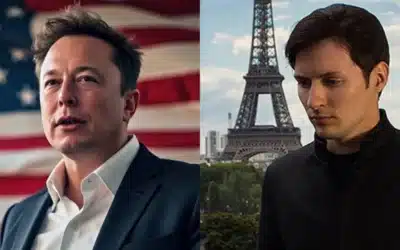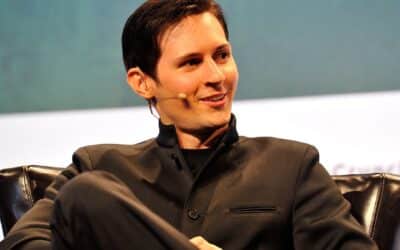The arrest of Pavel Durov is for any media outlet in France an unexpected opportunity to move from the main subject that can make the news in August, the weather, to a case that can be a milestone in history – by arousing global interest, as in the case of the CEO of Telegram.
Life is about choosing the moment and in the Durov affair, that moment from August 24 to 28 (he was indicted on time for the opening ceremony of the Paralympic Games in Paris) could not have come at a better time to make the headlines in the media. The arrest – surprise but well prepared – of the Franco-Russian CEO – among other nationalities – of the Telegram messaging service – which, more than an app, is a Dubai digital multinational with insolent success – could hardly not have been an event, as there was no other to eclipse it.
The interest also lies in the mystery and secrecy cultivated by Durov about his private life. He’s a character from a novel, impetuous, sulfurous, libertarian and multi-billionaire, whose life at 40 is already fuller than a film script. The slightest mention of his name is by itself an event, which does not escape Telegram and among all its users, first and foremost those who worship its CEO as if he were the guardian protecting Telegram, which they have elevated to the level of a holly sanctuary for freedom! If it’s this sanctuary that the French authorities are about to desecrate by attacking its guardian, it’s going to hit the media like a bombshell – and not only on Telegram but globally.
As soon as Durov was arrested, traditional media -TV channels first- launched their “live” and “continuous” coverage, whose receipt is long and well known, in the wake of social media, faster and more responsive to reveal major trends or weak signals in public opinion.
The Durov case is one of those that have long made legal columns so popular in the newspaper: they can indeed become intellectually captivating though they have, visually, nothing captivating to show.
The case is no exception to the rule: instead of “live”, the coverage quickly turns into a rather dull television report of the arrest, mixing some old rare footage of Durov with other random shots, such as those of Le Bourget airport at night or of a few police cars –sirens wailing and blue flashing lights on- speeding somewhere in Paris towards an office building, since Durov is not even taken to prison but to the National Anti-Fraud Office, where he is placed in police custody for 24 hours – that can be extended or shortened depending on his interrogation.
For the media, police custody is reminiscent of purgatory in the figurative sense, “a place or time of trial, of expiation”, since it’s impossible to tell how long it will last and nothing will filter out before it ends. Yet, on the merits of the case, the media don’t know much except that on a Saturday night at 8 p.m. in France, they won’t know more – and let’s not talk about Sunday! The French Ministry of the Interior nevertheless makes a statement indicating that “this arrest is the result of an in-depth investigation carried out in collaboration with several European agencies” concerning potential violations of European financial regulations. Durov is accused of failing to comply with certain transparency obligations regarding financial transactions on its platform. His interrogation must determine whether formal charges will be laid, with additional evidence being examined during his police custody. With this statement, the Ministry wants the attention to focus on financial issues, which will nonetheless remain very secondary in international reactions, which will focus on freedom of speech and censorship.
When nothing happens during such legal cases, the media have developed very effective ways for drafting scenarios based on the known facts. From this raw material, journalists, experts and opinion leaders will produce anecdotes and stories, issues and lessons, which will make up a more complete story that the media will bring to life in a great deal of debate, testimonies, investigations, and cross-checks, which will end up drowning the known facts in the vast ocean of context and information elements.
These sequences quickly take over from a police custody that offers nothing new to say or write, the news being gradually crushed by the assumptions, hypotheses, theories and other projections, fed by social media and their focus on freedom of expression. They give the case a completely new dimension, without boundaries when it comes to an imaginary that speaks to each of us as an individual, and to all of us as a society. This transfer from the reality of what is happening now to fiction and from the live moment to perpetual times, is driven by talk shows and non-stop news channels. With social media buzzing, they have an almost inexhaustible reservoir of questions and reactions they can use to keep the air going and maintain a dialogue with social media, both on what is happening and what could happen.
Durov’s arrest will set social media ablaze on Sunday already, with international reactions driving this communication spike. In detail, these international reactions are interesting because they show that to win the race of spreading -and shaping- opinions, the fame of the messenger is a competitive advantage that cannot be challenged by the opinion published by a less famous challenger, regardless the relevance or quality of the opinion, as this will not impact its visibility, importance or influence on a subject. In other words, if Taylor Swift took a stand on nuclear safety, her opinion would automatically carry more weight and impact than that of the International Atomic Energy Agency, which does not have as many followers as she does.
At the beginning, there were three of us
This is exactly the number of messengers at the start of the wave of international reactions that the media will echo in their coverage and analysis of the Durov case.
Elon Musk was the first to pull the trigger, for political reasons but also commercial ones as the owner of X, whose imperative to make profits he has never hidden. On Saturday night, he launched the hashtag #FreePavel, which will meet with huge and immediate success. This hashtag will give messages that use it greater visibility on X. By the time Europeans woke up on Sunday morning, Musk’s first -and very smart- post had already gone viral. He simply published “Liberté. Liberté ! Liberté ?” in French, showing his support for Durov without expressing it. This post alone mobilized much of what the media described as a wave of support from around the world. Elon Musk will post another text warning of “dangerous times” for tech business leaders, helping to link the arrest of Telegram’s CEO to the regulation of digital platforms.
It’s Edward Snowden, the former NSA agent, who will amplify this concern, which will quickly grow over millions of social media users. He is the first to call Durov’s arrest “an assault on the basic human rights of speech and association,” expressing his sole opinion without grounding it on facts, and adding that he is “surprised and deeply saddened that Macron has descended to the level of taking hostages as a means for gaining access to private communications. It lowers not only France, but the world.”
Last, on Sunday, Chris Pavlovski, CEO of Rumble, will give some sort of reality to the threat that would have fallen on France and Europe by posting on X that he had “just safely departed from Europe” following this arrest, adding that “France has threatened Rumble, and now they have crossed a red line by arresting Telegram’s CEO, Pavel Durov, reportedly for not censoring speech.” Although it’s difficult to assess the extent to which his statement served to promote Rumble or support Durov, countless media quoted Pavlovski’s words, despite being “reportedly” inaccurate and simplistic on the reasons for the arrest: far from discrediting Pavloski’s fled and opinion, his wording was taken up by many media and propelled the author into many discussions, showing how powerful it is to keep a subject simple, not to say simplistic. On social media, it’s as effective as doping in sport, and it’s authorized even if it means it will always increase the performance of publications whose content is approximate or even borderline false compared to those whose content aims for precision and accuracy.
Far from surfing on this wave of international reactions, Telegram, on its own channel, will wait until Sunday evening and the extension of its CEO’s police custody to assure that he “has nothing to hide and (he) travels frequently in Europe“, adding that “Telegram complies with EU laws, including the Digital Services Act, its moderation action is within industry standards and constantly improving”, adding that it is “absurd to claim that a platform or its owner are responsible for abuse of that platform“.
Noteworthy enough, no official statement from competing messaging platforms such as WhatsApp or Signal came in support to these 3, which will nevertheless be taken as representative for all digital companies, none of whose giants expressed a position.
Biased political reactions
Russian media will react strongly, accusing France of liberticidal behavior and extensively covering a demonstration in support of Durov and Telegram in front of the French embassy in Moscow. The spokesman for the Russian presidency, Dmitry Peskov warned that these prosecutions of a “Russian citizen” must not “turn into political persecution.” This statement, prophetic at a time when Durov was simply in police custody, will popularize the image that he is behind bars – even though his custody took place in the most ordinary offices.
In another statement widely spread by social media, Maria Zakharova, spokesperson for the Russian Ministry of Foreign Affairs, criticized what she saw as a “double standard” in Western countries. Recalling that in 2018, many international NGOs had condemned a Russian court decision to block Telegram, decision which was never fully implemented, she asked on her Telegram channel: “Do you think they will call on Paris this time and demand Durov’s release or will they swallow their tongues?” It’s rather obvious that these remarks and their political intention contributed to conveying a false perception of Pavel Durov’s arrest. And it only took two Russian reactions to trigger the avalanche of all those that followed.
They will be less widely reported in Europe and in the United States, where media outlets note the irony of Russian criticism of freedom of expression, given the authorities’ history of censorship and media repression. The Kremlin’s position is perceived as hypocritical by some Western observers, without this point of view reaching a higher consensus than the Russian authorities’ one. The arrest is surrounded by disinformation, including accounts linked to Russian propaganda in France. In support of Durov, hacker groups, mainly pro-Russian, will also claim responsibility for denial of service (DDoS) attacks against several French websites.
In the United States, it is the post on X by former US presidential candidate Robert F. Kennedy Jr. on the “urgency of protecting freedom of speech” that will most often be quoted in media to show that the American political class is taking part in the international reactions’ wave. His post is not, however, representative of the Biden administration – which has not communicated on the case – nor of the political positions expressed in the United States, which on Durov’s case mainly come from the Republican Party and its supporters, whose posts are also much inspired by Elon Musk.
His open support to the US presidential candidate Donald Trump logically explains why Elon Musk has become a thought leader for pro-Republican circles. In their messages, they use Durov’s arrest to denounce the inability of the Biden administration and of the Democrats to defend the First Amendment: the threads thus show this debate is national and part of the election campaign on social media. Tucker Carlson, the former Fox News host who had the rare opportunity to interview Durov last April, is a representative voice for such opinions mixing Durov’s arrest with the US presidential election, e.g. when he says “The [US President Joe] Biden administration encouraging France [President Emmanuel] Macron to arrest the owner and founder of Telegram, Pavel Durov, who’s right now in a French prison. That seems like, I mean, that’s the hallmark of dictatorship, it sounds to me.”
On the Democrats’ side, opinions will be less numerous and often in response to attacks on the Biden administration: as all other discussions on the US presidential election, those on Durov reflect the polarization of the American public opinion. While these controversies will add numbers to the social media communication peak on Sunday 25 August, these numbers don’t mean mobilization and direct interest in Telegram or its CEO nor taking position on issues related to his arrest. On social media, they show the undeniable support for freedom of speech, which for American citizens is sanctuarized by the 1st Amendment, far ahead of Telegram.
Last, several articles and reactions echo comments from Ravina Shamdasani, UN spokesperson in Geneva. During a press briefing of the Office of the High Commissioner for Human Rights, she notes the case “raises many human rights issues” and announces that the Office of the High Commissioner plans to produce a document that “will establish the parameters within which this kind of situation must be considered.” These two sentences will be enough to claim that the United Nations reacted to Durov’s arrest, in most quotes telling it condemns the French decision or denounces the true face of both France and Europe – authoritarian or liberticidal. Though this statement and announcement have not been confirmed by any UN body, they were quickly taken up – and reinterpreted if necessary – as a UN official statement, using its hashtag to add visibility on social media. In fact, the two comments made during the Geneva press point acted as a UN official statement, although not representative of any position taken by the Organization.
Although official statements remain rare and do not represent a broad international consensus, with criticism coming mainly from a few specific public and political names, Emmanuel Macron reacts on Monday on X to affirm that the arrest is “in no way a political decision” but is part of a judicial investigation. He also recalls that France is “committed to freedom of speech and communication“, while stressing the need for platforms to cooperate with the authorities in the fight against criminal content. However, this statement will not lower tensions and concerns about the possible impact of this arrest on France’s reputation as defenders of digital rights and freedom of speech.
The European Commission reframes the legal scope of the case
In one of its official press briefings, the European Commission clearly said that the Durov case falls under French national jurisdiction alone. The Commission spokesperson told media that his arrest “has nothing to do with the company’s obligations under the EU’s Digital Services Act (DSA),” stressing that “criminal prosecution is not among the potential penalties for violating the Digital Services Act” and that the DSA “does not define what is illegal, nor does it establish a criminal offense.” In other words, the case is indeed a matter for French justice.
This statement goes against the majority opinion in the media, which sees the case resulting from the implementation of European policies and regulations imposing content moderation obligations. The very clear position expressed by the European Commission corrects the misinterpretation of European law in the case and its wrong use reported to the facts: it comes as early as Monday but too late to rebalance positions on the threats to freedom of speech that have gone viral under the multiplier effect of algorithms, whose settings leave no chance for an opinion by the European Commission to catch up and counterbalance an opinion that has become viral on social media.
While the mechanics of social media make it easy to understand why the European Commission is less famous than Elon Musk, the low impact of the Institution’s statements on the positions taken by the media is more worrying and shows how difficult it is for an official voice, sharing verified information, to be heard and speak louder than the social media noise. This noise will also drown out the voice of the Belgian Telecommunications Regulatory Authority (BIPT), which is responsible for supervising Telegram’s compliance with the DSA (which has chosen Belgium for its legal representation in the EU). Specifying that it “is neither a police authority nor a judicial authority and therefore has not been involved in the criminal investigation conducted by the French authorities”, the Authority confirms the European Commission opinion, which will help nuancing positions and analyses in the Belgian media.
It is only with the end of his police custody that the media frenzy caused by the surprise arrest of Pavel Durov, who was indicted and released under strict judicial control, including a 5-million-euro bail and a ban on leaving France, subsided. Telegram has since begun to cooperate with the French judiciary, which could be seen as progress in resolving some of the legal issues that led to the arrest: however, these new developments have not been widely commented on by other messaging platforms or major players in the digital sector.
As for the media, from August 28 on, they focused on the Paris 2024 Paralympic Games and a new wave of international reactions, less controversial and more spontaneous than the one provoked by the arrest of Pavel Durov, who must have also been delighted by the enthusiasm for the Games! It allowed him to emerge from the eye of the media storm at the same speed it had fallen on him, no wave of international reactions having greeted his release!



